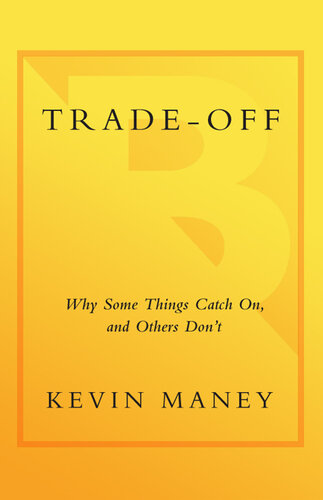
Trade-Off
Why Some Things Catch On, and Others Don't
کتاب های مرتبط
- اطلاعات
- نقد و بررسی
- دیدگاه کاربران
نقد و بررسی

September 14, 2009
Joining the nonfiction tradition of redefining simple concepts in terms of more complicated ones, technology journalist Maney presents theories of fidelity (consumer experience) and convenience (ease of getting/using products) to explain the success or failure of marketable goods. Terms like "fidelity swap" and "fidelity belly" are rife, but Maney's explanations boil down to the conflict between ego gratification and straight-up laziness: visit McDonalds, and you get an easy (cheap) meal while impressing nobody; attend Harvard and you'll impress people, but at an inconvenience cost of hard work and big money. Maney's plethora of examples range from Wal-Mart and Starbucks to newspapers and fashion labels: "A big part of fidelity is derived from a product's aura and identity... thus, $20,000 for a Hermes bag." Some honest insights do crop up-"High convenience is not about love, but about need... about habit"; "Mass is about convenience, and luxury is about fidelity. They can't coexist"-which might clue in general readers to the forces behind their shopping choices, but should prove old hat for experienced business readers.

October 1, 2009
Freelance journalist Maney ("The Maverick and His Machine: Thomas Watson, Sr. and the Making of IBM") distills the world's most successful business ventures into two categories: those that succeed by giving customers top-notch sensory experiences and those that succeed using super convenience. He terms this the Fidelity Swap. Maney cites examples of companies that have succeeded or failed based on this principle. For example, the success of Walmart can be attributed to their philosophy of customer convenience, no high-end atmosphere required. Conversely, Starbucks uses ambience and a unique customer experience to gain success. Maney further states that a successful product will not offer both convenience and "fidelity of experience." Coach and Tiffany are successful owing to the latter; if they offered more convenience (in this case, an array of cheaper products), they would become devalued brands. This book fits well with Chip Heath and Dan Heath's "Made To Stick: Why Some Ideas Survive and Others Die" as another book demonstrating how social theory can explain successful business ventures. VERDICT An enlightening and entertaining book that will have a wide readership among followers of current business studies or of popular culture and current trends.Poppy Johnson-Renvall, Mesalands Community Coll. Lib., Tucumcari, NM
Copyright 2009 Library Journal, LLC Used with permission.

























دیدگاه کاربران